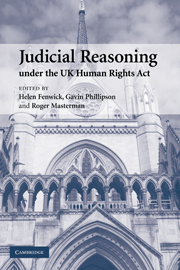Book contents
- Frontmatter
- Contents
- List of contributors
- Foreword
- Preface and acknowledgments
- Table of cases
- Table of legislation
- Table of treaties
- 1 The Human Rights Act in contemporary context
- PART I The interpretation of the Human Rights Act 1998
- PART II The Human Rights Act and substantive law
- 9 The common law, privacy and the Convention
- 10 Judicial reasoning in clashing rights cases
- 11 Family law and the Human Rights Act 1998: judicial restraint or revolution?
- 12 Article 14 ECHR: a protector, not a prosecutor
- 13 Criminal procedure, the presumption of innocence and judicial reasoning under the Human Rights Act
- 14 Concluding remarks
- Index
13 - Criminal procedure, the presumption of innocence and judicial reasoning under the Human Rights Act
Published online by Cambridge University Press: 30 October 2009
- Frontmatter
- Contents
- List of contributors
- Foreword
- Preface and acknowledgments
- Table of cases
- Table of legislation
- Table of treaties
- 1 The Human Rights Act in contemporary context
- PART I The interpretation of the Human Rights Act 1998
- PART II The Human Rights Act and substantive law
- 9 The common law, privacy and the Convention
- 10 Judicial reasoning in clashing rights cases
- 11 Family law and the Human Rights Act 1998: judicial restraint or revolution?
- 12 Article 14 ECHR: a protector, not a prosecutor
- 13 Criminal procedure, the presumption of innocence and judicial reasoning under the Human Rights Act
- 14 Concluding remarks
- Index
Summary
Preliminaries: objectives, taxonomy and method
Why is criminal procedure relevant to the topic of judicial reasoning under the Human Rights Act 1998? Readers might be forgiven for thinking that the connection between these topics is not self-evident. Indeed, several of the participants in the Durham conference from which the chapters comprising this volume are drawn explicitly posed the question to me: interesting as it might be in its own sphere, what place does a paper on criminal procedure have in a conference or edited collection devoted to exploring the impact of the HRA on judicial reasoning in the United Kingdom?
I hope that this chapter will supply a convincing answer to that question. On one view, it expresses a perfectly reasonable challenge, but it also, I think, betrays misconceptions and even a certain ignorance that I would like to try to dispel. The question has, if not exactly hidden profundity, then at least partly occluded depths. Below its surface lurk other, taxonomic and methodological questions with important theoretical and practical ramifications. To which legal topics or issues is the HRA pertinent? Should an evaluation of its impact consider every eligible example of judicial reasoning or only a sample selection? If a sampling approach is preferred, or dictated on pragmatic grounds, by what criteria should inclusion in the sample be arbitrated?
- Type
- Chapter
- Information
- Judicial Reasoning under the UK Human Rights Act , pp. 377 - 423Publisher: Cambridge University PressPrint publication year: 2007
- 1
- Cited by

